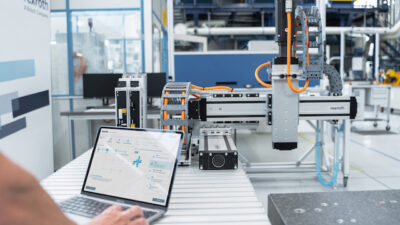Although automation and control systems continue to grow in scope and complexity, end users seem inclined to devote fewer in-house resources to developing and maintaining them. Many manufacturers have eliminated their staff engineering positions entirely, preferring to hire the help they need when they need it.
|
Although automation and control systems continue to grow in scope and complexity, end users seem inclined to devote fewer in-house resources to developing and maintaining them. Many manufacturers have eliminated their staff engineering positions entirely, preferring to hire the help they need when they need it.
The engineers that get downsized in the process may not appreciate this trend, but the system integrators of the automation industry certainly do. Integrators are the companies that manufacturers turn to for help designing, installing, connecting, and commissioning the various components of new and retrofit automation systems.
As manufacturers outsource more automation engineering work, the system integration business has grown dramatically. A survey conducted by Control Engineering in 1970 turned up just 103 system integration firms or ‘systems houses’ as they were more commonly known back then. ‘In the early days of industrial computer control, system commissioning was the responsibility of the plant engineering staff working closely with the principal vendor,’ explains longtime industry watcher Terry McMahon (McMahon Technology Associates, Leonia, N.J.). ‘Independent system integrators were few in number and minor in terms of economic impact.’
A more recent survey for the 1999 Automation Integrator Guide ( Control Engineering , mid-December 1998) identified more than a thousand engineering companies that can provide some or all of the services required for their clients’ automation projects. The survey also showed that not all of the respondents capable of integrating a control system call themselves ‘system integrators’ (see ‘What’s in a Name?’ pie chart).
What’s in a Name?
Of the 1,000+ automation engineering companies that qualified for
Control Engineering’s 1999 Automation Integrator Guide,
only 39% actually described themselves as ‘system integrators.’
The rest described themselves as shown here. Some chose multiple descriptions.
Integrators everywhere
By whatever name, engineers of all kinds have been quietly moving into the automation system integration business (‘Who’s Who in automation system integration.’) Distributors have added engineering services to supplement product sales. Service and repair companies have started offering pre- as well as post-installation assistance. Software houses, especially PLC programmers, have begun installing hardware while panel shops have gotten into the programming business.
Why? Reasons vary, but virtually all relate to better serving a client’s needs. ‘Our company got started in the systems integration activity as an extension of our distribution business,’ says Paul Karty, vice president of Motion Control Corp. (Farmington Hills, Mich.). ‘An increasing number of our customers are either looking for the lower cost hardware purchase or an integrated solution.’
Large and small
Larger, more general purpose engineering companies capable of building entire factories have also gotten into the system integration business.
‘At the Engineering Services Group (ESG) our vision is to provide our customers with the services that they need,’ says Chris Becker, operations manager for Controls Engineering Services (a member company of ESG in Southfield, Mich.). ‘Although we are typically a process engineering company, ESG is in business to provide professional engineering services of the greatest value to manufacturing enterprises throughout the world. If systems integration is required, then ESG will provide it.’
Other engineering firms, such as Design Technology Corp.(Billerica, Mass.), build custom machines equipped with their own internal automation systems. President Marvin Menzin notes that the design and installation of a plant’s automated equipment has become a key step in many integration projects. ‘Our work must be started earlier than the system integration effort so that a proven machine or equipment process is in place prior to, or at least concurrent with, systems integration.’
Even some of the engineers that were downsized in the 80s and early 90s have gotten back into the action by returning to their former employers as contract employees. ‘Downsizing released many experienced engineers into the market,’ says John Wason, vice president of the system integrator practice at Automation Research Corp.(Dedham, Mass.). ‘Most ended up becoming consultants, starting new system integration companies, or going to work for existing system integrators.
Vendors join in
Mr. Wason also notes that ‘as the 80s ended, system integrators found themselves competing not only with the traditional engineering companies, but with all of the automation system suppliers that now had their own in-house engineering staffs.’ Honeywell Industrial Automation and Control (Phoenix, Ariz.), Moore Process Automation Solutions (Spring House, Pa.), and The Foxboro Company (Foxboro, Mass.) are some of the largest equipment vendors that offer their own system integration services. Ironically, though, many of these vendors have avoided the label ‘system integrator,’ preferring to promote the virtues of their latest products rather than the engineering services that they can provide to put all the pieces together.
‘That’s changing,’ says Honeywell IAC’s Rob Baxter, vice president of the services business unit. ‘We’ve steadily expanded our services offerings because of the growing trend towards outsourcing in the industrial environment. Increasingly, process manufacturers are looking to outsource those tasks they do not consider to be their core competencies. Our customers are looking to Honeywell to deliver the skills and support they need.’
Other vendors have gotten into the system integration business as a matter of necessity. Control Techniques Drives (Chanhassen, Minn.), for example, supplies variable-speed drives for machine control applications. The advent of digital drives has enabled a host of advanced motion control functions. As a result, says national systems sales manager John Lesnick, ‘We have to understand clients’ applications and either show them how they can perform the functions themselves, or provide that service for them.’
There are also several vendors that offer their engineering services along with the services of third-party system integrators. Rockwell Automation (Mayfield Heights, O.) has its own Information and Automation Systems group plus a Global Technical Services organization as well as a network of independent system integrator partners around the world. Foxboro supports a program for approved system integrators that provide ‘subcontracting services and a means to satisfy our customers’ small-to-medium sized system requirements in the same professional manner as large system projects are completed,’ according to David Shephard, Foxboro’s director of strategic business development.
Starting from scratch
Conversely, a few system integrators that of their own, started out selling just their engineering services have introduced products often the software tools they originally developed for their own use. Sequencia (Phoenix, Ariz.), makers of OpenBatch and EnterpriseBatch software, started out as a services business known as Process and Instrumentation Diagnostics (PID). ‘Our domain expertise led to the development of products which incorporated our practical experience with batch processing,’ says strategic alliance manager Paul Nowicki.
Of course many system integrators founded their companies specifically to provide contract engineering services. With very low start-up costs, brand new system integration firms can begin small and expand as one project leads to another. Eclipse Automation (Longmont, Colo.), for example, was founded by president Kevin Conlon and just one partner. ‘We basically ‘boot strapped’ our company and can now boast an employee count of approximately fifty people. We used strategic alliances to get leads then completed all our jobs.’
Like the vendors, distributors, and engineering companies cited above, most start-up integrators have gotten into the automation services business to meet customer needs. Rick Meeker, president of Process Control Solutions (PCS, Tallahassee, Fla.), was originally an automation end-user. He relates that ‘after eight and a half years as a process control engineer and department manager, I started PCS to provide a level of service and expertise in the process controls area I had a hard time finding as a customer.’
Telling one from another
Clearly, there are many different kinds of engineering companies that provide automation system integration services. They have evolved along different paths and label themselves differently, but what really differentiates one from another?
Specialized industry experience is the key for ControlTouch (Louisville, Ky.). The company was formed by engineers laid off then re-hired by a conveyor manufacturer. Frank Dahl, vice president for sales and marketing, notes that ‘having been involved in the conveyor business since the early 1980’s, we can draw upon a vast amount of experience in conveyor controls when working on projects. We now have many customers, but at least 50 percent of our systems integration business is associated with material handling control systems.’
William Shriver, associate project manager at Lockwood Greene (Spartonburg, S.C.) notes that large, full service engineering companies offer several advantages. ‘We are a global company and can support our global partners’ projects both domestically and internationally. In addition to integration experience, we have engineers with years of process experience throughout many industries and regions.’
Other advantages
That’s not to say that size is all important. Smaller independent system integrators can provide specialized technical expertise. For example, the Flolo Systems Group (Bensenville, Ill.) focuses specifically on drive systems. ‘Our strong expertise in controls and motors is an advantage. We can package and enhance standard drives to solve a customer’s motion control problem,’ says director of engineering Mike McBlaine.
According to Gary Foster, president of Automation Engineering Corp. (Greer, S.C.), objectivity is another advantage that makes independent system integrators particularly valuable to customers. ‘As an independent system integrator, we seek to build a relationship with the customer by becoming a reliable source of design and programming. We are not seeking to build a source of product sales’.
On the other hand, a vendor’s own in-house application engineering department can offer detailed knowledge of every product they sell and apply customer input to future design decisions. Original equipment manufacturers (OEMs) that install their own control systems offer a similar advantage.
According to Ken Lawrence, sales manager at SI Handling Systems (Easton, Pa.), ‘Our OEM manufacturing and engineering capabilities give us the ability to offer many services from one source that a customer would usually have to get from multiple companies.’
Good for business
Ironically, system integrators are becoming equally valuable to the automation industry’s equipment vendors, even though they sometimes compete. ‘Part of the system integrator’s expertise is to keep up with today’s rapid advancements in automation control,’ says Dan Shartle, system integrator program specialist at Phoenix Contact (Harrisburg, Pa.). ‘Many vendors, including Phoenix Contact, rely on their expertise to provide quality solutions using the full functionality and benefits of our products.’
Dan Schlosser, business manager for Rockwell Automation’s Process Business (Milwaukee, Wis.) agrees. ‘The role of a system integrator is changing. Manufacturers are seeking control solutions, rather than control ‘pieces and parts,’ and the integrator is being called upon for complete control systems. Rockwell Automation is working to equip system integrators with the knowledge to assess a customer’s needs, and to help the customer determine a complete control solution which best meets the particular application.’
For more information about more than a thousand automation system integrators of every variety discussed here, log on to the 1999 Automation Integrator Guide at www.controleng.com/integrator.htm .
Who’s who in automation system integration
Many different companies contribute to a typical system integration project. The following list divides them into several broad categories and describes the general functions of each. These are by no means hard and fast job descriptions. Most companies fit into more than one definition, and some switch from category to category as clients’ needs change. For more information about 1,000+ automation integrators of all kinds log on to the 1999 Automation Integrator Guide at
Application engineers -Application engineers that work for vendors or their distributors generally concentrate on applying the vendor’s equipment to a client’s project. Some application engineering departments will offer design and implementation services as well; others will provide little more than technical advice. A few will even work with products from competing vendors if the client so desires.
Consulting Engineers -Consulting companies range in size from single individuals to huge multi-national corporations. They provide consulting and design services in specific technical disciplines such as civil, mechanical, electrical, and automation engineering. Larger consulting firms may also assume ultimate responsibility for completing the entire project. Individual consultants and smaller consulting firms generally do not.
Electrical Contractors -Electricians and technicians working for electrical contractors actually run the wires and hook up the electrical equipment specified in the project’s design. They may also design and build the required control panels.
Independent system integrators, systems houses -To varying degrees, system integrators work on every aspect of an automation project other than actually manufacturing the control equipment. They may design and implement the control system required by an A&E’s overall plant design. They may design the panels and electrical systems that the electrical contractor implements. They may perform all of these functions themselves or subcontract pieces of a project to specialists such as panel shops and software houses. A system integrator generally assumes ultimate responsibility for completing the entire project from initial consultation through final checkout. Truly independent integrators do so without favoring any particular vendor’s products.
Machine builders, original equipment manufacturers (OEMs) – Some automation projects require specialized machinery or other equipment with built-in control systems. Specialty machine builders and OEMs generally perform the software and hardware integration for the custom equipment they fabricate. Some machine builders may also integrate their custom control systems into the overall plant control system.
Panel shops, panel builders -Panel builders assemble a project’s control equipment into the cabinets or ‘panels’ that sit next to the automated machinery. Many system integrators, machine builders, and OEMs maintain their own in-house panel shops. Other independent panel shops execute designs supplied by system integrators or A&Es.
Software houses, contract programmers -Automation software houses provide engineers to program the computers required for an automation project (PLCs and DCSs for control; PCs for data acquisition, control, and simulation; business systems for data analysis and archiving; etc.). They may use their own software products or specialize in configuring commercial software packages. Many software houses are also value-added resellers.
Value added resellers (VARs), value added distributors (VADs) -VARs buy products from a vendor, add something of value, and resell the complete package to the end-user. The value they add may be other compatible products or services such as software configuration, troubleshooting, or complete system integration. VARs generally focus on a particular vendor’s products or a particular industry’s applications. VADs also maintain product inventories and provide technical advice.
Top 5 Reasons to use System Integrators:
Supplement in-house expertise
Speed overall system development
Provide integration expertise lacking from vendors or distributors.
Leverage strategic alliances between integrators and supplies.
Acquire specilized application-specific information.



